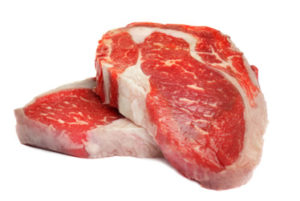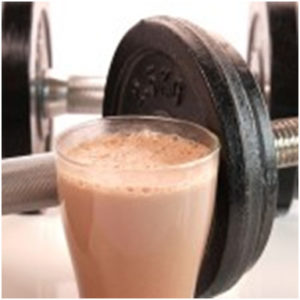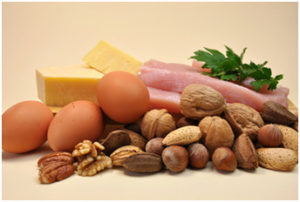Are You Getting Too Much Protein?
Author: Dr. Stephen Chaney
 How much protein do you need? In a recent article entitled “Can You Get Too Much Protein?” the New York Times asserted that most Americans were getting too much protein in their diet. They went on to imply that protein supplements were useless at best and might be downright harmful at worst.
How much protein do you need? In a recent article entitled “Can You Get Too Much Protein?” the New York Times asserted that most Americans were getting too much protein in their diet. They went on to imply that protein supplements were useless at best and might be downright harmful at worst.
If you happened to read this article, you are probably wondering whether it is true or just another example of media bias. If you have read other articles about supplementation in the New York Times, you may have already suspected that they are biased against the use of supplements.
However, the problem goes way beyond media bias. In today’s online world everyone is a writer and everyone is an editor. More importantly, news is instant. Newspapers and journalists no longer have the time and resources to fully research a topic before they publish it. When a story comes along that fits their bias, the temptation is strong to publish it immediately.
In this issue of “Health Tips From the Professor” I will try to give you a more balanced perspective. If you would like other examples of a more balanced perspective, you might want to read articles from Harvard Medical School’s Health Publications newsletter or WebMD .
What Did The New York Times Get Right?
The New York Times didn’t completely miss the mark. Here are a few things that they got right:
- Most Americans are getting more than the RDA for protein in their daily diets. They imply that is too much. However, the prevailing view among nutrition experts today is that the RDA is too low for some groups, and many Americans are getting too little protein, not too much.
- They do acknowledge that there are groups who aren’t getting enough protein, for example – teenage girls, pregnant and lactating women, people over 60, and professional athletes. I would add, based on recent studies, that any adult who is engaged in a weight loss program and/or
 regular, vigorous workouts will also benefit from extra protein, especially after their workout. If you combine all those categories, we are talking about the majority of Americans not getting enough protein. The only exception is the otherwise healthy adults who are “couch potatoes”.
regular, vigorous workouts will also benefit from extra protein, especially after their workout. If you combine all those categories, we are talking about the majority of Americans not getting enough protein. The only exception is the otherwise healthy adults who are “couch potatoes”.
- They are correct in saying that the average “couch potato” adult in the US doesn’t need more protein. However, even the “couch potatoes” among us would benefit from a healthy protein supplement in place of some of the high fat, high cholesterol animal protein they are eating. They don’t need more protein. They just need better protein.
- Finally, they are correct in saying many protein supplements are either unsafe or suffer from poor quality control, topics I have covered in previous issues of “Health Tips From the Professor”. My advice is simple. Avoid those protein supplements making extravagant claims about “exploding” your muscles and giving you boundless energy. Also, choose protein supplements made by reputable companies that employ rigorous quality controls.
What Did The New York Times Get Wrong?
- The main theme of their article was that most Americans were getting too much protein. They acknowledged that some nutritionists advocated consuming more protein but implied that most experts did not agree. That paradigm is 20 years old. The evidence has shifted. Most experts today feel that many Americans aren’t getting enough protein.
- They warned high protein intake could be harmful. It could lead to increased risk of cancer, heart disease, diabetes and kidney disease. Let’s put
 those claims into perspective.
those claims into perspective.
- Increased risk of cancer is linked to high intake of animal protein, especially red meat and processed meats.
- Increased risk of heart disease and diabetes is linked to high intake of fat and cholesterol rich animal proteins.
- In short, for these diseases it’s the kind of protein, not the amount, that is the problem.
- As for kidney disease, it is clear that protein intake should be restricted when you have kidney disease. It is not clear that high protein intake can cause kidney disease in healthy adults.
- Finally, they assumed that most people just added protein supplements to the protein they were already eating. If that were true, it might be a problem. However, most people use protein supplements in place of some of the high fat animal protein in their diet. They aren’t necessarily eating more protein. They are eating healthier protein.
What Do Recent Studies Show?
If we look at recent publications on the subject, it is clear the New York Times article did not accurately report what current studies show about protein needs of Americans. Here are just a few examples:
High protein diets improve physical function and weight loss in older adults. In this study participants on the high protein diet:
- Lost 15% more weight than those on the low protein diet. More importantly, the high protein group had:
- 60% better retention of lean body mass (muscle).
- 25% better loss of fat mass.
- They also performed substantially better on physical function tests than the low protein group. There was no exercise component to this study. The improvement in physical function was solely related to the better retention of muscle mass and the greater loss of fat mass in the high protein group.
 High protein diets improve fat mass loss and muscle mass gain in young adults on a weight loss diet(American Journal of Clinical Nutrition, 103: 738-746, 2016). In this study the high protein group:
High protein diets improve fat mass loss and muscle mass gain in young adults on a weight loss diet(American Journal of Clinical Nutrition, 103: 738-746, 2016). In this study the high protein group:
- Had 33% greater loss of fat mass than the low protein group.
- Increased muscle mass by an average of 2.6 pounds compared to no change in the low protein group.
High protein diets improve satiety (The Journal of Nutrition, 146: 637-645, 2016). In this study the high protein group:
- Reported greater satiety and less hunger between breakfast and lunch.
- Consumed 12% fewer calories at lunch.
These are just a few recent studies. There are dozens of other studies that come to the same conclusions about how much protein you need. This is the new paradigm.
Why do some studies still come up with negative results?
The problem may be in the experimental design of those studies. Here are two recent papers that give some hints as to why some studies might fail to see the benefit of protein supplementation.
Protein quality matters (Nutrition & Metabolism, doi: 10.1186/s12986-016-0124-8). This review concluded that protein quality, particularly the leucine content of the protein, was important in determining the effectiveness of that protein supplement in enhancing muscle mass increases following resistance training,
Spread protein throughout the day(American Journal of Physiology, endocrinology & Metabolism, 308: E734-E743, 2015 ). This study concluded that high protein intake is most effective at promoting muscle gain and weight loss when protein intake is spread evenly throughout the day.
In short, these studies suggest that good quality protein and good experimental design are essential if you wish to evaluate the role of additional protein on things like muscle mass and weight loss.
How Much Protein Do You Need?
What Do RDAs and Dietary Guidelines Say? Let’s start by looking at the RDA and how it has changed over the years. You probably have heard 
 that the RDA is 46 grams of protein a day for women and 56 grams a day for men. However, that is misleading. The RDA for protein is based on body weight. The conversion is 0.36 grams of protein for every pound of body weight.
that the RDA is 46 grams of protein a day for women and 56 grams a day for men. However, that is misleading. The RDA for protein is based on body weight. The conversion is 0.36 grams of protein for every pound of body weight.
A simple calculation will tell you that 46 grams per day for women assumes they weigh 127 pounds, and 56 grams for men assumes they weigh 155 pounds. We haven’t seen those weights since the 50’s. Today the average weight for a 50-year-old woman is 170 pounds. The average weight for a 50-year-old man is 201 pounds. That translates into an RDA of 61 grams for the average woman and 72 grams for the average man.
You may have also heard that 10% of our calories from protein would meet our RDA requirements, and most Americans are currently getting around 16% of their calories from protein. The New York Times article implied that 16% of calories from protein was too much. Anything above that would be excessive, perhaps even dangerous.
What do the guidelines say? The current Dietary Guidelines for Americans recognizes individual variations in protein needs and recommends we get between 10% and 35% of our daily calories from protein. For a 2,000 calorie diet that represents between 50 and 175 grams of protein/day.
What Are The Experts Saying? Experts are not just recommending more protein for some groups. They are making specific recommendations for how much protein people in those groups should be getting. How much protein do you need?
- If you are an inactive, otherwise healthy, middle-aged adult, 10% of your calories from protein or 0.36 grams of protein a day per pound of body weight is sufficient. However, you would probably benefit from healthier protein choices.
- If you are a teenage girl, your protein requirements are only slightly higher than a woman in your 20s. However, teenage diets are often not what they should be. You may not be getting the protein you need. Aim for around 0.38 grams of protein per pound of body weight per day.
- If you are pregnant or lactating, your protein requirements are between 0.47 and 0.56 grams per pound of body weight per day. That represents a 30-55% increase in protein requirements. Your developing baby needs the extra protein. Be sure you are getting enough.
- If you are over 50, you are probably losing a little muscle mass every day (a condition referred to as sarcopenia). To offset that muscle loss, most experts on aging recommend seniors increase their protein intake to around 0.5 grams of protein per pound of body weight per day. Ideally, that protein should be spread evenly throughout the day with about 25-30 grams of protein per meal. Leucine needs are increased as well, so leucine-rich protein sources are best. I’ve covered this topic in detail in a previous issue Protein Needs of Older Adults of “Health Tips From the Professor.”
- If you are an elite athlete, the International Society For Sports Nutrition recommends 0.63 to 0.9 grams of leucine-rich protein per pound per day. That is 1.7 to 2.5 times the RDA for sedentary adults.
- If you are not an athlete, but work out on a regular basis, you will achieve better muscle gain from your workouts if you consume leucine-rich protein after each workout. If you are a young adult, 15-20 grams will suffice. If you are an older adult 20-25 grams is a better target. I’ve also covered this topic in a previous issue Leucine Trigger Muscle Growth of “Health Tips From the Professor.”
- If you are trying to lose weight, diets providing about 0.72 grams of leucine-rich protein per pound (~ 2X the RDA or 28% of the total calories) appear to be more effective than RDA levels of protein at preserving muscle mass and reducing fat mass. Again, this topic is covered in a previous issue High Protein Diets and Weight Loss of “Health Tips From the Professor.”
- Higher protein intake is most effective when coupled with resistance (weight bearing) exercise.
- Higher protein intake is also most effective when spread throughout the day rather concentrated in a post-workout supplement or at a single meal.
The Bottom Line
- A recent New York Times article asserted that most Americans were already getting too much protein in their diets and that dietary protein supplements were either unnecessary or dangerous.
- That paradigm is at least 20 years out of date. Today, most experts agree that many Americans are getting too little protein in their diet.
- Groups most likely to need additional protein are teenage girls, pregnant and lactating women, adults over 50, elite athletes, people who work out regularly, and people on weight loss diets.
- The only group routinely getting more than enough protein from their diets are otherwise healthy, adult “couch potatoes,” and most of them would benefit from healthier protein choices in their diet.
- Increased protein intake is best utilized when coupled with resistance (weight-bearing) exercise. It is also best utilized when spread out evenly throughout the day rather than being concentrated in a single post-workout supplement or a single meal.
- The most current guidelines for protein needs of various groups are given in the article above.
These statements have not been evaluated by the Food and Drug Administration. This information is not intended to diagnose, treat, cure or prevent any disease.
